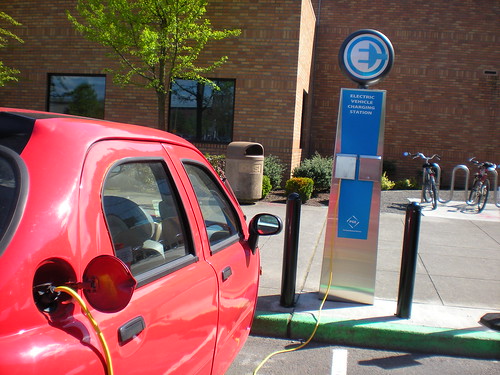‘Elephant in the Room’ – Electric Vehicle Program is Auto Industry’s Moonshot; Comes With A Huge Price Tag & No Promises
(Source: Wired)
The electrification of the automobile has been called the auto industry’s “moon shot,” an analogy that works because of both the technology involved and the cost to develop it. Automakers are pouring hundreds of millions of dollars into the effort with no promise that it will lead to affordable battery-powered vehicles anytime soon — or any guarantee people will buy them once they’re available.
All of the major automakers are racing to put EVs in showrooms as early as next year, and they’re spending money like sailors on shore leave to do it. General Motors has spent about $1 billion developing the Chevrolet Volt. Chrysler wants to invest $448 million in its electric vehicle program to build cars like the Circuit, pictured above at the Los Angeles Auto Show. Elon Musk’s personal investment in Tesla Motors tops $75 million.
The Apollo program cost more than $100 billion in today’s dollars, and as Ron Cogan, founder and editor of Green Car Journal and greencar.com notes, there was no imperative to produce a reasonably priced consumer product. Not so with electric vehicles – the whole point is to sell cars. The Obama Administration is betting heavily on the technology, having recently approved almost $8 billion to help automakers retoolfactories to produce EVs and other fuel-efficient vehicles. Another $16 billion will be doled out next year.
“What people overlook is that accomplishing ‘big picture’ programs like Apollo require accepting the concept of unlimited spending to achieve the mission,” Cogan says. “Current levels of unprecedented federal spending notwithstanding, electric cars are not an exclusive answer to future transportation challenges and consumers will not be willing to buy them at all costs.”
Early adopters and hardcore EV advocates will gladly pay that much, but will the rest of us pay $15,000 to $25,000 more for a car that runs on electricity? Cogan doesn’t think so and says EVs should be considered mid- to long-term solutions until automakers — and the battery makers they rely upon — can bring costs down to a level competitive with vehicles propelled by internal combustion.
Until then, he says, more efficient gasoline cars, clean diesel vehicles and hybrids will comprise the majority of cars sold even as EVs become an increasingly common sight in showrooms.
Click here to read the entire article.


nice blog. good to see Bernie W. getting some ink. check out our sites at UC Berkeley. The Institute of Transportation Studies, The Traffic Safety Center, The Transportation Sustainability Research Center, The Berkeley Center for Future Urban Transport, the University of California Transportation Center and Partners for Advanced Transit and Highways.
Oops, one typo in the url for The Berkeley Center for Future Urban Transport.
Hey, fantastic webpage you have here, but I merely was going to inform you about about what may perhaps possibly certainly be a internet browser compatibility problem. So i am using Windows Vista 64 bit along with Flock, and the format is strange. It’s just a bit hard to see certain parts of your blog, and I am running my screen resolution at 1280 x 1024. I believe you didn’t aim for your internet site to seem so weird, and so is there any way it is possible to assist me deal with this issue?
Recommend using Chrome or Firefox or IE for better experience. The site is designed with these popular browsers in mind.